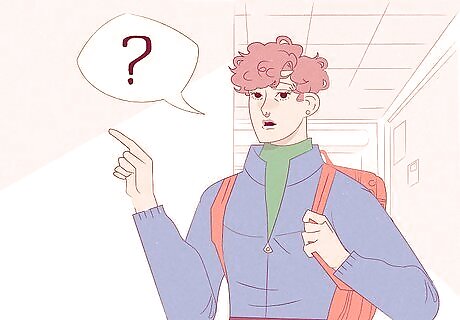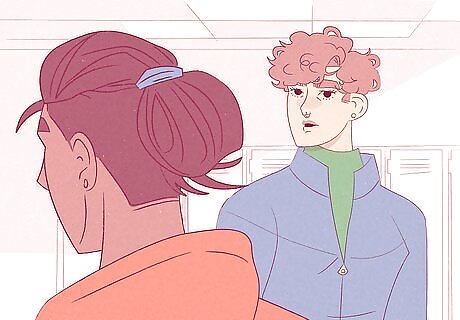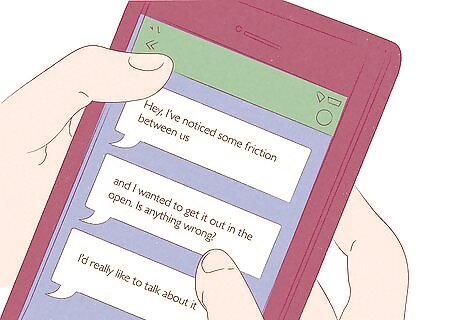
views
- People might be mean to you for reasons that have nothing to do with you: they might be having a bad day, or they might just have poor communication skills.
- Your haters may be mean and rude because they're jealous of you or insecure about themselves.
- Ignoring people who are mean might make them stop—they may get bored if they can’t get a reaction from you.
Reasons People Are Mean

They have poor communication skills. You know how babies cry because they literally have no other way to ask for what they need? These people might be just like that. They might be defensive because they're totally unable to share what they need. Because of this, they think that they have to be mean and aggressive to get attention. It's possible your haters are dealing with problems at home that they don't feel they can talk about. Lots of people become cruel to others when they themselves are dealing with a hurtful or toxic home life.

They want social power. The people being mean to you could just believe cruelty is their key to ruling the school. They may also be a little less mean when they're alone: if someone's friend group insists on bullying others, they may hop in on the action because they don't want to be left out. But while being mean might win them some social power, that power will be almost entirely based on fear. Any popularity they get through bullying will be hollow, frail, and worthless.

They’re insecure. We all get insecure sometimes (some of us more than others). It can really mess with how you see other people and even affect the way you move through the world. Think about the last time you were feeling bad about yourself: did you feel like snapping people’s heads off? Now, it’s no excuse for bad behavior, but it might be the reason these people are being so mean. And it has nothing whatsoever to do with you. It’s possible that they’re victims of bullying. As the saying goes, “Hurting people hurt people.” In other words, they may have been targeted by other people, and they think picking on someone else will make them feel strong again.

They’re resentful of you. Your mom may have said “They’re just jealous” at some point when you complained about other kids being mean, and she was probably right. Jealousy can make people act nuts. Consider if the people being mean resent you for anything—your looks, your grades, your autographed Lana Del Rey T-shirt, your friends. Even if this isn’t the reason they’re mistreating you, going through a mental list of all the awesome things about you and your life is sure to cheer you up a little bit!

They’re not having a good day. Do these people act like this all the time, or is it new behavior? If they’re not usually mean to you, it could just be that they’re going through a rough time and are a little on edge. It doesn't give them an excuse to bully others, though. Depending on how close you are to them, you might try asking if anything’s wrong. They may appreciate knowing you care.

They think they’re better than you. Some people are just spoiled jerks who think they’re superior to others. They might think they’re better than you for totally meaningless reasons—maybe they’re rich and think it’s OK to treat people with less money like dirt, or maybe you’re a Swiftie and they’re adamantly anti-TayTay. Prejudice doesn’t really adhere to logic. People who bully due to prejudice (class, racial, sexual orientation, gender, what have you) may have picked up their biases from their parents and don't realize it's cruel—but it's still not OK.

They don’t know how to manage their emotions. For some people, big emotions like anger, sadness, or fear can get out of hand pretty easily. If the people being mean to you possess poor emotional skills and are triggered by anything, even something super minor, it could result in a blowup that’s totally not proportional to whatever set them off. It might be something as simple as you accidentally bumping into them. Even though you apologized, they might overreact by yelling at you or bursting into tears. Later on, they might realize they overreacted (or not), but at the moment, whatever happened felt like the end of the world. Reader Poll: We asked 269 wikiHow readers, and 53% of them admitted that they typically respond to negative emotions by lashing out at others. [Take Poll]

They lack self-awareness. While you’re poring over this article to figure out how to navigate your day-to-day interactions, the truth is not everyone is as analytical or self-aware. Some people just go through life doing and saying stuff without really thinking about how they come off. The people being mean to you could be totally unaware they’re being rude and completely oblivious to the effect their attitude has on you.

They disagree with you. You say po-tay-to, and they say po-tah-to, and they just can’t stand it. We’re being flippant here, but if you’re butting heads over something—especially if it’s something sensitive, like politics or religion—they might think that warrants a little meanness and aggression. Their reaction to your conflicting opinion may be a sign they’re not the best people to share your views with. That doesn’t mean you need to stop expressing your opinions, but you may want to be selective about who you discuss them with.

They’re just generally disrespectful. Their attitude may have nothing to do with you at all, and everything to do with how they treat people in general. Pay attention and see how they act toward others: are they mean to everyone, or are you the odd one out? If it's the first option, the problem is with them—not you. Do they seem to have any friends? If they’re mean to everyone, they probably don’t. At the same time, not having any friends can really make someone feel mad at the world. It’s a vicious cycle. You don’t owe a cruel person anything, but if you suspect they’re mean because they’re lonely, try to be kind.
How to React to People Who Are Mean to You

Wait it out. If you suspect their attitude toward you is caused by something totally unrelated to you—for example, their dog just died and they’re having a really hard time with it—give them a little time to get through it. They may not intend to be so mean, and on a better day, they wouldn’t be. Try approaching your haters the same way Bill Murray does in What About Bob? Treat them like telephones. “If I meet somebody who I don’t think likes me, I say to myself, ‘Bob, this one is temporarily out of order. Don’t break the connection, just hang up and try again.’” This might be a better option if their behavior isn’t too intrusive or if you’re able to distance yourself from them. If you’re stuck working on a science project with them, for example, you don’t need to tolerate verbal abuse.

Ask them why they’re being mean. If you’re feeling brave and want to hone your conflict resolution skills, ask them directly why they’re acting this way. They might not realize the effect their actions have on you. It’s also possible you did something to offend them without realizing it, and they’ll appreciate the opportunity to hash things out with you. You might say, “Hey, I’ve noticed some friction between us, and I wanted to get it out in the open. Is anything wrong? I’d really like to talk about it.” Try to use “I” statements—“I feel really upset with the way you’ve been treating me”—rather than “you” statements—“You’re always treating me really terribly.” “I” statements keep the focus on you and your feelings, while “you” statements may cause them to get defensive. Try to maintain a calm attitude as you confront them, and realize that if they’re just jerks, they might not be receptive to a respectful conversation. Prepare to turn and leave if they don’t respond kindly. You can try approaching them in person, but texting is also a great low-pressure approach.

Set strict boundaries. Confronting them may lead to a productive conversation—or they might just be bullies. Regardless, it’s a chance to let them know you won’t tolerate their behavior and establish firm boundaries. Standing up to a bully can be extremely hard, but it may make them back off: bullies often pick on people who they don’t think will be brave enough to call them out on their behavior. Employ assertive body language when you approach them: stand up straight and keep your gaze focused on them. Speak firmly and clearly. You might say something like, “I don't like the way you treat me. From now on, I expect you to be nicer. You don’t have to like me, but I'm not going to take your mean behavior anymore.” If you’re nervous approaching them alone, do it in a public setting—say, in the hall between classes, if they’re a school bully. Or enlist a friend or two to tag along for support.

Ignore them. It’s easier said than done, we know. Mean people can make an otherwise amazing day absolutely horrible. They can really do a number on your self-esteem. If you can, try to adopt a chill mentality toward your haters: don’t give their actions more weight than they deserve. Realize their attitude is their problem—not yours. It’s hard to do this, but it gets easier over time. It’s likely that they’re picking on you because they want to elicit an emotional reaction and feel powerful. By ignoring them, you’re depriving them of that reaction, and they might lose interest in bullying you.

Tell an authority figure about their behavior if it's extreme. If you're dealing with a vicious bully, or if you have reason to believe they could become physically aggressive toward you, reach out to an authority figure for support—a parent, a teacher, or even the police. Don’t approach them yourself: it’s not worth putting yourself in harm’s way. It’s likely the person you turn to has been bullied at some point in their life too, so not only will they be able to discipline the people picking on you, but they might also have some advice or general sympathy to offer.
Considering Your Own Behavior

Ask yourself if you’ve done anything to contribute to their behavior. Be honest: is it possible you’ve displayed any behavior to turn them off, even unintentionally? While the problem may very well lie with the other people, it’s worth it to reflect on your recent interactions with them to make sure you haven’t accidentally done something to offend them. Maybe you offended them, complain a lot, or are simply being too sensitive. Try to take a step back and look at the situation objectively. Even something seemingly innocent like trying to be positive when they’re having a bad day might upset them—yes, that’s right, it’s possible to be too pleasant! They might interpret your optimism as toxic positivity, and feel as if their bad mood has been invalidated. Consider talking to friends who may have seen you and the other people together. They may be able to give you some insight into why these people are being so mean. It’s also worth noting that most, if not all, of us feel like everyone hates us at one point or another. Usually, this happens when we’re feeling low or have some unmet needs. As a popular internet adage goes, “If you feel like everyone hates you, you probably need to sleep. If you feel like you hate everyone, you probably need to eat.”




















Comments
0 comment